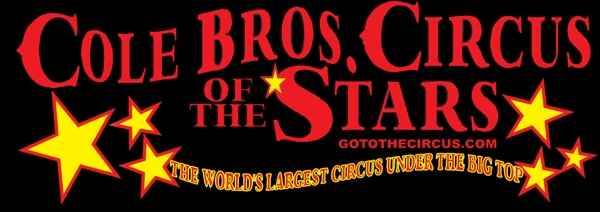From the Cole Bros. Circus Website
Hundreds of circuses have come and gone since the mid-1800s. Circuses large and small, carried by horse-drawn wagons or on dozens of railroad cars, hree-ring circuses and dog-and-pony shows alike criss-crossed the North American Continent bringing entertainment to the public. Cole Bros. Circus remains the only circus to have survived a century still appearing much as it did over one hundred years ago under the Big Top. Since 1884, three generations of Americans have thrilled to the sights, smells, sounds and feats of skill that typify the Cole Bros. Circus. The Cole Bros. trademark has enjoyed longevity because it represents value and integrity to the American public. Today, the Cole name continues to signify quality family entertainment that has captivated million of Americans.
William Washington Cole (1847-1915) began the Cole story. His "W.W. Cole's New Colossal Shows" (1884) were, as he stated, "Presented in a reputable manner by reputable people." With the most modern of 19th century equipment and performances of the highest caliber, Cole achieved enormous success. In fact, when he died, he left an estate of Five Million Dollars, quite a sum in the year 1915! Around the turn of the century, the name of the show was changed to "Cole Bros. Circus" and purchased by Canadian showman Martin Downs and his son, James. During the 1920s, brothers Floyd and Howard King owned and operated Cole Bros. Circus, bringing it to the western frontier with appearances scheduled at military bases, mining camps, and in remote boom towns.
The Great Depression nearly signaled an end to Cole Bros. Circus, but the faith and perseverance of two of the most highly esteemed men in the circus industry kept the show on the road. Jesse Adkins and Zack Terrell acquired and rebuilt Cole Bros. into a circus equal in magnitude to Ringling Bros., the largest American circus of the era. During the 1935 season, Adkins and Terrell moved the show on thirty-five double-length railroad cars, treating townsfolk to a giant street parade from the railroad yard to the circus grounds. Some of the ornate parade wagons used then have been preserved and are currently on display in the famous CIRCUS WORLD MUSEUM in Baraboo, Wisconsin.
A new chapter in circus history was begun in 1935 when the legendary performer Clyde Beatty was featured with the Cole Bros. Circus, initiating the long association of the Cole Bros. and Clyde Beatty names. The roster of the Cole Bros. Circus alumni reads like a Who's Who in the entertainment industry. In addition to Clyde Beatty, matinee idol as well as the most notable wild animal trainer of all times, Cole Bros. Circus featured the immortal character created by Emmett Kelly, "Weary Willie", the Zacchini "Human Cannonball" act, the Cristiani Family bareback riders, the Great Wallendas, and a young Burt Lancaster on the Flying Trapeze.
As times changed in America, Cole Bros. Circus had to adapt. By 1939, Cole Bros. Circus remained the only circus that continued staging a daily horse-drawn parade. Soon, even Cole Bros. had stored its parade wagons in the winter quarters barn, bringing them out only on special occasions, like Harry Truman's inaugural parade in Washington, D.C. when the Cole Bros. steam calliope played "Meet Me in St. Louis, Louie". The advent of television in the 1950's had circuses going down for what seemed like the final count. John Ringling North sounded the death knell for American Big Top circuses in 1956 when he ordered Ringling Bros., Barnum and Bailey to fold its tents, scale down, and retreat to arenas.
The management of Cole Bros. Circus, however, believed in the viability of the tented tradition, and instead of downsizing combined with Clyde Beatty Circus to maintain the tradition of presenting the real American three-ring circus, under the Big Top. For its 1957 season, Clyde Beatty-Cole Bros. Circus converted from rail cars to trucks and moved to new winterquarters in DeLand, Florida.
Under the ownership of showman Frank McClosky and entrepreneur-politician Jerry Collins, the Beatty-Cole show flourished during the 1960s and 70s. In 1981, after several years of operating the show himself following the death of his partner, Jerry Collins donated the circus to Florida State University, home of the FSU Flying High Circus, pledging his desire to "...benefit people of all ages. I want to preserve the tented circus for children and also to help the students at Florida State." FSU sold its $2.5 million gift to Cole veteran John W. Pugh, who formed Cole Bros. Circus, Inc. in February of 1982.
Today, families from Florida to Maine, from Long Island Sound to Cajun country eagerly anticipate the arrival of The New Cole Bros. Circus for "children of all ages" know that its the circus that remains faithful to the tented tradition of presenting wholesome entertainment in a friendly atmosphere that makes them feel welcome. A fitting heir to the legacy of W. W. Cole, owner John Pugh is committed to the tradition of presenting "in a reputable manner by reputable people" the real, American, three-ring circus under the Big Top. |

